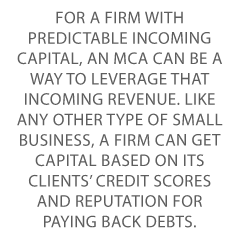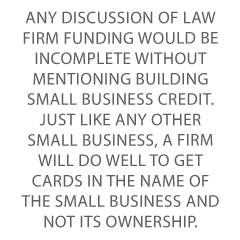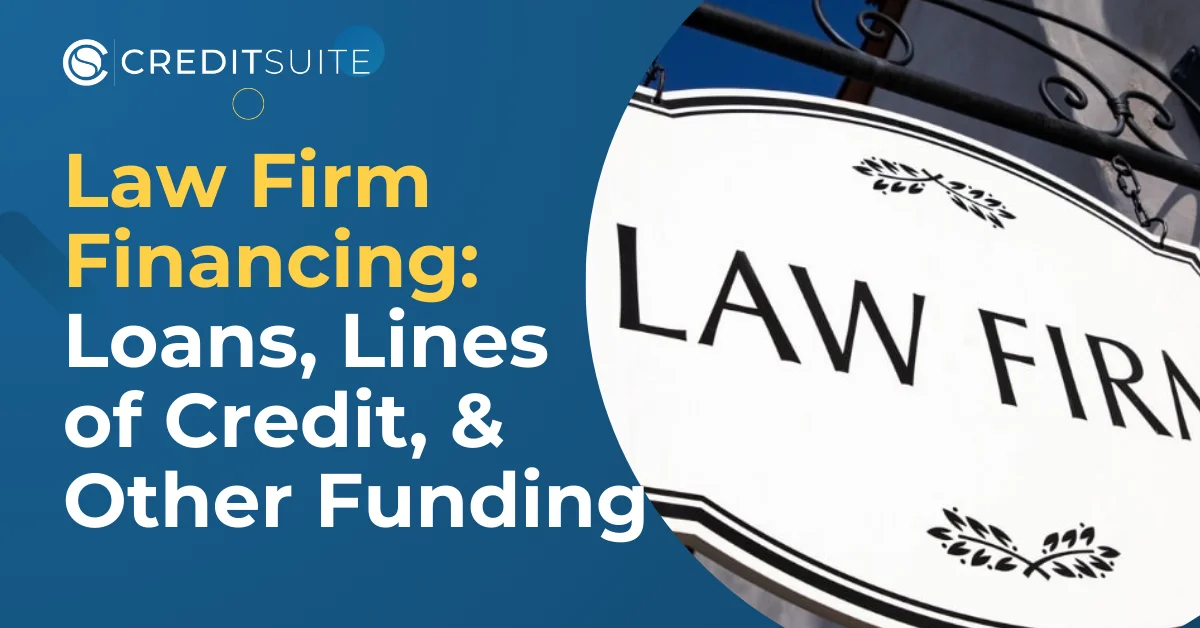Are you looking for law firm financing options? Like any other business, a law firm needs a financing option or two. This is especially true when you’re waiting to be paid a contingency fee from a settlement or are deep in the weeds of litigation.
Just because a case may be dragging on (sometimes for years) does not mean that your expenses are put on hold. Your law practice is a small business, and you still have operating expenses. Law firm financing can help you settle your bills.
What is Law Firm Financing?
Also called law firm funding, it is a new way for attorneys and law firms to cover litigation expenses, expand services to clients, and maximize their cash flow.
This is by using non-recourse capital from a third party in exchange for a percentage of the financial recovery from a portfolio of lawsuits.
This often goes beyond traditional lenders and your standard bank loan. A law firm is like a small business, but at the same time, its needs aren’t necessarily for a term loan.
A firm may need lawsuit funding or pre-settlement funding to bolster cash flow while waiting for a settlement to be negotiated. As litigation drags on, a firm may need legal funding just to cover a transaction or two—or more.
A regular business loan might not work for litigation funding. This is because law firms’ financing needs are less linear and predictable than those of other businesses.
Legal firms tend to depend on settlements and judgments for money. But a case can take years to wend its way through the courts. Even mediation and arbitration can take a while.
With the possible exception of in-house counsel for large corporations (think insurance companies and the like), law firms don’t accrue revenue every single month for nearly identical amounts.
Best Law firm Financing Options
Option 1 – Partner Equity Financing
Equity in a law firm is the ability to partake of a share of the firm’s profits. Litigation firm partners can be equity or not. This far more traditional form of attorney funding has probably been around longer than SBA loans.
Non-equity partners often continue to receive a salary as their compensation—instead of being paid based on firm profits. But equity partners have to fund their buy-in. As a result, a law firm can use this form of equity financing to raise working capital.
Because there can be ethical considerations with taking venture capital funds, a law firm is often relegated to equity partner buy-in if they want to sell equity in the business. Of course, the more equity partners a firm takes on, the more diluted the profits become.
As a result of ethical considerations, even a cutting-edge law firm will likely not be able to work with a VC firm—at least not to finance the firm itself. But law firms have turned profits by working with VC firms to invest in other companies.
And in England, the bar against non-lawyer ownership of firms has been dropped. So, will the American bar soon allow law firms to be at least partly owned by non-lawyers?
The jury is still out.
Option 2 – Commercial Real Estate Financing Through Esquire Bank
Esquire is a virtual bank that specializes in law firms and litigation finance. But their expertise goes beyond litigation funding. They will also work with a firm on commercial realty financing.
Their suite of business loan products for a legal borrower includes acquisition loans, refinance loans, transitional loans, and owner-occupied loans.
For products directly related to the legal industry, they offer case cost lines of credit, working capital lines of credit, law firm term loans, and partner buy-in/buyout loans.
Use case inventory and receivables as collateral. Terms run from short-term loans to maturity terms of up to seven years.
Get advance rates for up to 50% of your firm’s unpledged fee amount. With a qualified settlement fund loan, paying back the business loan amount is tied directly to your firm’s fee payment.
Get loans for a settled case, too, as you wait for payment.
Esquire also offers business checking and savings accounts for firms.
Option 3 – a Merchant Cash Advance
 For a firm with predictable incoming capital, an MCA can be a way to leverage that incoming revenue. Like any other type of small business, a firm can get capital based on its clients’ credit scores and reputation for paying back debts.
For a firm with predictable incoming capital, an MCA can be a way to leverage that incoming revenue. Like any other type of small business, a firm can get capital based on its clients’ credit scores and reputation for paying back debts.
This form of cash flow financing comes with hefty interest rates. However, if a lawyer does not have very good personal credit, it can be a viable law firm loan option. This can be a relatively common situation with attorneys who are still paying back hefty student loans.
MCAs are not for everyone. But they can be a way to get funding for a law firm when many other attorney funding options are just plain out of reach. If a firm cannot qualify for standard debt financing like a loan, an MCA can be a good way to get working capital.
Incoming revenue has to be predictable, and it has to be provable before a firm can get an MCA.
Option 4 – a Credit Facility
A credit facility is a kind of business loan. It allows the borrower business to take out money over an extended period of time rather than reapplying for a loan each time it needs capital.
That is, credit facilities let a company (including litigation firms) take out a kind of umbrella loan for generating capital over an extended period of time.
Credit facilities include revolving loan facilities, committed facilities, letters of credit, and most retail credit accounts.
Unlike with loans, you don’t need a specific reason for the capital in order to apply for credit facilities. And, since your firm is only taking out capital when it needs to, you control when you go into debt, and how much.
Contrast this with a loan, where you just get the money upfront and then have to pay amortized interest over time. Credit facilities, like loans, can be short or long-term.
Option 5 – Credit Cards
With a credit card, if you need to withdraw cash, it will come at a higher interest rate. Financing transactions on a day-to-day basis, can be a viable option, particularly if you pay them off on time and avoid having to pay interest.
Any discussion of law firm funding would be incomplete without mentioning building small business credit. Just like any other small business, a firm will do well to get cards in the name of the small business and not its ownership.
A firm that is an LLC is in the best position to build business credit, as the limited liability corporate structure makes an entity separate from its owner. This also separates the law firm’s credit from its owners—even equity partners.
Like with other businesses, law firms should establish a Fundability Foundation™ as that will help with getting cards, loans, and other attorney funding now and in the future.
Option 6 – Voucher Funding or Portfolio Financing
Voucher funding is an advance on a legal receivable (like legal fees), rather than a lawsuit financing. Much like an MCA, a voucher fund company will purchase a portion of the firm’s expected fee.
Then, once the case is settled or adjudicated, and the fee is paid, the firm pays back the amount lent plus fees.
But note that this type of funding is only available for attorneys and law firms hired by state governments.
Portfolio financing is a way to get law firm funding based on the value of a firm’s contingency caseload. Unlike single-case funding, a firm can use its portfolio to finance a future case.
This can be especially helpful in litigation where the firm has to move quickly. If the Statute of Limitations is about to expire, a firm can take on the case without having to worry about getting litigation funding to cover it.
Then the litigation firm can concentrate on doing what it does best—legal services.
Why Choose Law Firm Financing over Traditional Bank Loans?
Lawyers may find that bank loans and lines of credit are more difficult to get and not practical for their requirements.
A traditional lender will perform personal credit checks as part of any loan qualification process. Since attorneys run their businesses as individuals, their personal credit is affected by business decisions. They may not meet bank standards. This makes approval less likely.
Banks and other conventional financial institutions will often ask for some form of collateral. This can be bonds, stocks, or real estate. The collateral is in exchange for a loan or lines of credit.
But attorneys might have trouble meeting the qualifying standards. Many attorneys who would be seeking a financing option may not have much collateral tied to their businesses.
It is still possible to be approved for a loan by a bank. And bank loans often have a lower interest rate than alternative financing options. But a tough application process and monthly repayment requirement may discourage attorneys who need money right now.
Usual Requirements
Requirements will vary depending on the lender and the type of lending product sought. But most of the time, you should expect to provide business financials, credit scores, legal documents, and your personal financial history.
Online lenders are in general more lenient when it comes to requirements. They can offer more tailored solutions to law practices.
At the same time, banks can be more rigid. It can be the case that they are only willing to work with established businesses. They may also have fewer funding solutions with longer application processes.
Even with different lenders, there can be some similarities in law firm financing requirements. Expect to provide the following:
- Business financials like balance sheets, bank statements, tax returns, profit and loss statements, debt-to-equity ratio, expense ratios, cash flow history and projections, and debt schedule
- Credit scores
- Legal documents such as business licenses, medical licenses, and registrations
- Personal financial histories like bankruptcies or liens
Takeaways
When attorneys need money for their firms, traditional solutions can be as impractical as not using a computer to Shepardize a case. And creative financing solutions can have nuanced differences.
At Credit Suite, we can help you sift through multiple forms of funding to find which one is best. And we can help you make your firm Fundable™ so any lender will have evidence that you are a good credit risk.
Contact us today for more information.

